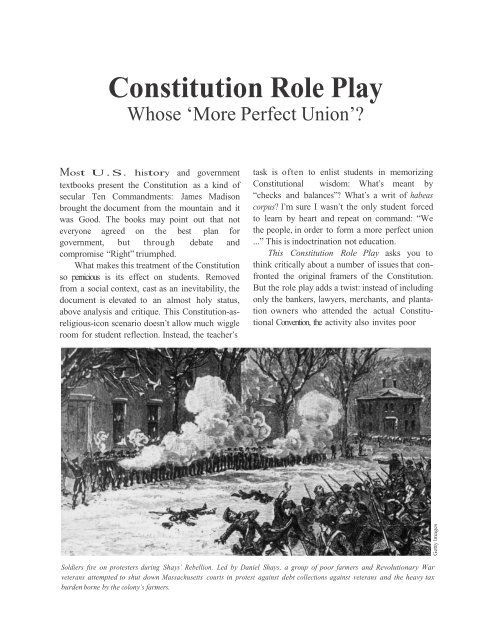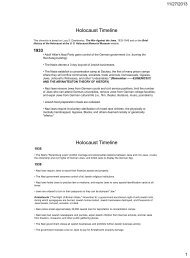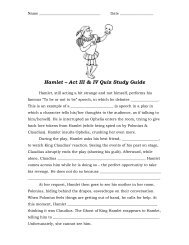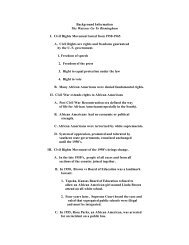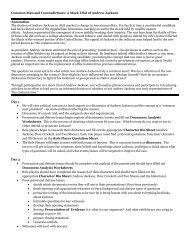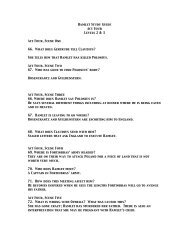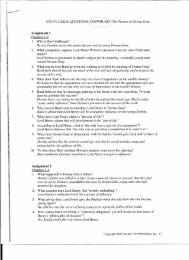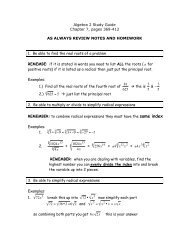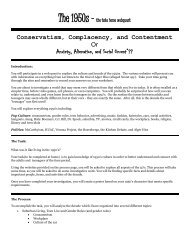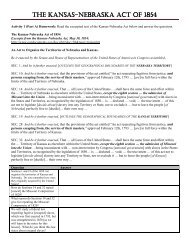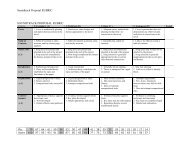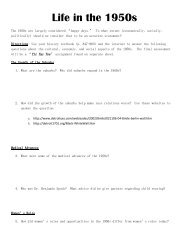Constitution Role Play - Warren Hills Regional School District
Constitution Role Play - Warren Hills Regional School District
Constitution Role Play - Warren Hills Regional School District
You also want an ePaper? Increase the reach of your titles
YUMPU automatically turns print PDFs into web optimized ePapers that Google loves.
Getty Images<strong>Constitution</strong> <strong>Role</strong> <strong>Play</strong>Whose ‗More Perfect Union‘?Most U.S. history and governmenttextbooks present the <strong>Constitution</strong> as a kind ofsecular Ten Commandments: James Madisonbrought the document from the mountain and itwas Good. The books may point out that noteveryone agreed on the best plan forgovernment, but through debate andcompromise ―Right‖ triumphed.What makes this treatment of the <strong>Constitution</strong>so pernicious is its effect on students. Removedfrom a social context, cast as an inevitability, thedocument is elevated to an almost holy status,above analysis and critique. This <strong>Constitution</strong>-asreligious-iconscenario doesn‘t allow much wiggleroom for student reflection. Instead, the teacher‘stask is often to enlist students in memorizing<strong>Constitution</strong>al wisdom: What‘s meant by―checks and balances‖? What‘s a writ of habeascorpus? I‘m sure I wasn‘t the only student forcedto learn by heart and repeat on command: ―Wethe people, in order to form a more perfect union...‖ This is indoctrination not education.This <strong>Constitution</strong> <strong>Role</strong> <strong>Play</strong> asks you tothink critically about a number of issues that confrontedthe original framers of the <strong>Constitution</strong>.But the role play adds a twist: instead of includingonly the bankers, lawyers, merchants, and plantationowners who attended the actual <strong>Constitution</strong>alConvention, the activity also invites poorSoldiers fire on protesters during Shays’ Rebellion. Led by Daniel Shays, a group of poor farmers and Revolutionary Warveterans attempted to shut down Massachusetts courts in protest against debt collections against veterans and the heavy taxburden borne by the colony’s farmers.
farmers, workers, indentured servants, and (GASP!!!) even enslaved African Americans and women. This morerepresentative assembly gives you a chance to see the partisan nature of the actual document produced in1787. My experience is that after you have struggled with a number of the questions that confronted the―Founding Fathers,‖ you will be primed to dig in to the document and see what it really said. You will bebetter equipped to recognize many of the nuances you might otherwise have missed.Procedure:1. We will read ―<strong>Constitution</strong>al Convention: Burning Issues,” to get a sense of the requirements of yoursocial group. It‘s vital that everyone is clear on each of the issues confronting them in the Convention.2. Each of you will be part of a group representing one of 8 roles:a. Southern Planterb. Yoemen (small) Farmerc. Slaved. Free Blacke. Northern Banker/Merchantf. Workerg. Indentured Servanth. White Women3. Group Caucuses - For each question you must propose at least one resolution (later on, these may change asa result of negotiations with other groups.) As parliamentary procedure dictates, you should preface yourproposals with ―Be it resolved that ...‖ For example, ―Be it resolved that slavery should be abolished in theUnited States.‖ Place an asterisk next to the resolutions they care most strongly about.4. Sessions - We then will begin the timed teaching/negotiating/alliance-building session. Half of yourgroup will stay put, and half will be traveling negotiators. These discussions will last 8-10 minutes persession. I will circulate to different groups, and occasionally butt in to raise questions or point outcontradictions. To ensure maximum participation of students in the class, travelers may not meet withother travelers, but only with seated members of other groups. The purpose of these sessions is togauge how well your proposals will be accepted, get a sense if any changes needed to be madeto your proposals in an effort to gain support, and to get a sense if any of your top priorityproposals are in danger of being ignored.5. Follow up Caucuses - You will return to your groups to prepare opening remarks you will make at theCongressional Hearing. You are to have an outlined set of notes that you will create. Your group is also toprepare a set of talking points for debate.6. Convention - We will begin the hearing by allowing one group to make its complete presentation, followedby a timed debate using parliamentary procedure.7. Some follow-up Group/Think/Share questions for discussion:a) In what ways was our class <strong>Constitution</strong>al Convention unrealistic? In what ways was it realistic?b) Which social groups made alliances with each other? Do you think that similar alliances were madein real life? [Discuss/Explore the extent to which racism may have prevented people fromsupporting each other‘s objectives.]c) Why might it have been easier for the wealthy social groups to unite and harder for the poorer
social groups to unite?d) In real life, how do you think the <strong>Constitution</strong> dealt with the issues we confronted in our classConvention?e) Which social groups wanted a strong national government? Which wanted the states to have morepower? Why?f) Which social groups wanted the greatest amount of democracy—power tothe people? Which wanted the least? Why?
handout<strong>Constitution</strong>al ConventionBurning IssuesRepresentatives from all the states except one are meeting to decide upon a new<strong>Constitution</strong>. This is the <strong>Constitution</strong>al Convention. You will deal with important issues that face thecountry. For each issue you must have a position. Some issues you will feel strongly about. Put anasterisk (*) next to each of these. Other issues you will not feel as strongly about. In the sessions, thesewill be the issues to discuss.Here are the issues you must have a position on for the new <strong>Constitution</strong>:1. Slavery.a. Slavery is now legal in some states. Should it continue to be legal in any of the United States?b. Black slaves are still brought into southern states (like Virginia and South Carolina) from outsidethe country to be sold to white plantation owners. Should the <strong>Constitution</strong> continue toallow this slave trade?c. Sometimes slaves run away from their owners in the South and come north. Should northernersbe forced to turn over runaway slaves to their owners?2. Some state legislatures have passed laws allowing debtors (people who owe money) to pay theirdebts ―in kind‖ with cows, pigs, tobacco, corn, etc. This is a traditional method of paying debts insome parts of the country. Should the Federal government continue to allow this practice?3. Many bonds were issued during the Revolution by the Continental Congress to pay soldiers andlenders. Should these bonds be paid back in full? Just a small amount for each dollar? Just tothose to whom they were originally issued? Not at all?4. Currently there is no national law determining who should be allowed to vote in elections. Somestates require people to own a certain amount of property to vote. Only one state (New Jersey)allows women to vote. In most states, black people may not vote, even if they are free. Who shouldbe allowed to vote in general elections?
handoUtMale Southern PlanterYou live in Virginia and you are atobacco planter. Your family owns about 30black slaves and you are quite wealthy. Yourwealth, however, depends on your slaves. Slavesdo all the hardest work. They plant, harvest, dry,pack, and load the tobacco to get it off for sale.You wouldn‘t know where you‘d get people to dothe work if you had no slaves. From time to timea slave will run away. You hire a slave catcher andusually the runaway is brought back. Sometimesthe slaves get up into the North before they‘recaught. But slaves are your property, andfortunately you usually get them back.The American colonies defeated Great Britainin the Revolution, but there are still serious problems.Business has been in confusion lately. Bankersare reluctant to lend money to anyone becausesome state legislatures are passing laws saying thatfarmers can pay debts to their creditors ―in kind‖:with cows, corn, or tobacco. You need to borrowfrom bankers to buy more slaves and land butuntil there is ―stability‖ the bankers won‘t lendmoney to anyone.There is also still a lot of protest from the―rabble‖—the poor farmers, the unemployed, andworkers in the towns and cities. Up in the state ofMassachusetts, Daniel Shays led a rebellion againstthe government and large property owners. As aproperty owner yourself, when these people talk of―equality,‖ you wonder if they mean to take awayyour property so you‘re equal to them! These peoplescare you. In some places they‘re even allowedto vote and run for office.During the Revolution, you sold supplies tothe Federal government and were paid in governmentbonds by Congress. These have becomeworthless. You want these debts paid back in goodmoney. It‘s only fair.Possible Historical FiguresGeorge Washington, James Madison. Don‘t pick Thomas Jefferson – he wasn‘t there.Questions:1. How do you make your money?2. How do you feel about slavery?3. How do you feel about the common people, ―the rabble‖?4. What problems are you concerned about?
handoUtYoemen (small) FarmerYou are part of a farming family witha small amount of land in western Massachusetts.You grow only enough to feed yourselves with alittle left over to sell in town.You are badly in debt because your cropsfailed last year and you had to borrow money tobuy food and a new plow. You‘re worried becausethe bank that lent you the money now demandspayment right away. On top of this problem, youhave been unable to pay your state taxes, whichare very high. The situation is desperate. In thisday and age, you can be thrown in jail for owingmoney or for being behind in tax payments.Worse yet, your land could be taken away to repayyour debts. If only you didn‘t have to repay in cash,you have crops you could give the banker insteadof money. But he says he‘s not willing to fill hisbank vault with your stinking crops. In the past,payment ―in kind‖ was very common.Everyone in your family risked their lives inthe Revolution fighting for freedom from GreatBritain and helping feed the Revolutionary army.But what kind of freedom is it when you can‘teven feed your own family, and you go to bed eachnight worried that you will end up in jail?In desperation, you and about 1,000 othersdecided to take the law into your own hands. Ledby Daniel Shays, an officer in the RevolutionaryWar, you gathered on August 29, 1786, at thecourthouse in Northampton. You were armedwith muskets, sticks, and swords. You stoppedthe trials of several debtors, demanding that thegovernment cut taxes and put more money incirculation. You succeeded in keeping the courtsclosed for several months. When you marchedon the town of Springfield the next February andattempted to capture the public supply of 7,000guns and 13,000 barrels of gunpowder, you weredefeated by state troops.You felt justified in this rebellion because youbelieve you had no choice. And even thoughthere are men in your family who are oldenough to vote, they can‘t because they don‘town enough property to qualify.If even your own state government can turnagainst the majority of the people, you worryeven more about the power that the federal(national) government might have under thisnew constitution. And how will the leaders beelected?Questions:1. How do you make your living?2. What are you worried about these days?3. What did you think of ―Shays‘ Rebellion‖?4. What do you want from a national (federal) government?
handoutEnslaved African AmericanEveryone in your family is e n s l a v e dand lives on a tobacco plantation in Virginia. Theyear is 1787. Eleven years ago the Declarationof Independence stated that ―all men arecreated equal.‖ And yet because your skin isblack and you were born a slave you still remaina slave. Obviously, the American Revolutiondidn‘t mean freedom for everyone. In fact, theman who wrote those words, Thomas Jefferson,is himself a Virginia slave owner.Your life as a slave is harsh. Up at dawn, quitwhen it gets dark, then more chores when youreturn from the fields. You are under the constantcontrol of your master, though with your familyyou have tried to carve out the best life you can.However, you know that if your owner felt like it,he could sell you to South Carolina or wherever hewanted. Your family could be split up in an instant.The <strong>Constitution</strong>al Convention raisesthe possibility of freedom. Slavery might beoutlawed. A number of states in the North havealready outlawed slavery, and there is much talkabout a b o l i s h i n g the slave trade—thebringing of new enslaved Africans into thecountry. Thousands of enslaved people havebeen allowed to buy or earn their freedom inVirginia in recent years. Maybe slavery will notbe outlawed in every state, but perhaps slaveswould be allowed to keep their freedom if theyescaped into a free state. True, the Revolutiondidn‘t free you, but the talk of liberty and justicemakes you want your fair share.But even if you were free, you wouldn‘town anything. You‘d have to start from scratch.You‘d likely be a poor farmer, even worse offthan those farmers up North w h o are beingthrown in jail because they can‘t pay their debtsor their taxes. Sure, you want freedom, but youwant real freedom. That means land and tools towork the land.Possible Historical FiguresSlaves who fought for the Americans became free after the war, so there are few records of slaves in1787. Please make up your own name.Questions:1. What things worry you?2. What do you hope the <strong>Constitution</strong> will do for you?3. What problems will you face if you gain your freedom?4. What kind of ―freedom‖ do you hope for?
handoutNorthern Banker/MerchantYou are a member of a prosperousbanker and merchant family in New York.You make much of your money by providingloans to other people and getting paid an intereston those loans.Very upsetting things have been happeningrecently. Many state legislatures have passed lawsallowing ―debtors‖—people who owe money—to pay their debts ―in kind‖ with corn, tobacco,or whatever they may have of any value. In otherwords, a banker might lend $100 and get paidback two cows, and a bushel of corn! You thinkthis is outrageous. There is very little respect forproperty anymore. The state legislatures havehad entirely too much power lately. Maybe if allthose poor people couldn‘t vote, these problemswouldn‘t happen.In some states with responsible state legislatures,people get put in jail when they don‘tpay what they owe. This is how it should be. Butthe last time the courts met in Massachusetts toput debtors in jail where they belong, the courtswere closed down by Daniel Shays and otherpoor people with guns and knives and clubs. Youknow that this rabble must be stopped.But there is some good news: you havebought up thousands of dollars of governmentbonds from people who were given these insteadof money when they were soldiers during theRevolution. You paid them ten cents for everydollar in bonds they gave you. Now there is aproposal to pay all the bonds back in cash, dollarfor dollar. You would make a lot of money. This,for a change, is exciting news.Questions:1. How do you make your living?2. How do you feel about the idea of ―payment in kind‖?3. How do you feel about Daniel Shays and people like him?4. What do you feel good about these days?
handoutWorkerYou are a shoemaker in Manchester,New Hampshire. You work in a small shopwhere you are paid according to the number ofshoes you make. You own your own tools.Times are hard right now. You had to go intodebt for $50 to buy your tools when you wentinto this line of work, right after theRevolutionary War ended. You figured themoney would be easy to repay because your stategovernment was issuing paper money, puttingmore money in circulation, and making it easierfor ordinary working people to buy things.But it hasn‘t worked out as you‘d expected. In1786, your state legislature voted to stop issuingpaper money. There is less money available nowand each dollar is worth more than it was. You can‘tcharge as much for your shoes because people can‘tbuy at the old high prices. Meanwhile the man wholent you money is hounding you and threatening totake you to court if you don‘t pay up immediately.This would be a disaster for you. You could be sentto jail where you‘d be unable to work to pay backthe money. Who knows when you‘d be let out?You‘ve heard that some people with problemslike yours have marched on the state legislaturewith clubs and guns, demanding lower taxes andthe printing of paper money. This makes sense toyou. After all, doesn‘t the Declaration of Independencesay that people have a right to rebel whentheir government becomes a tyranny?That was certainly one of the ideals that youenlisted in the Revolutionary Army to fight for.You didn‘t do it for the money. In fact, the governmentdidn‘t pay you any money. Instead, theyissued bonds—IOUs—which promised that youwould be paid a certain amount at a later date. Butafter the war, it looked like the government mightnever have enough money to pay people back.You, along with lots of other people, feared thatthese bonds would soon be worthless. So, you soldyour bonds to a banker for what little you couldget—about ten cents on the dollar. You figuredthat it was better to have some hard cash in handnow than to risk losing everything by waiting forthe government to pay up. Now you hear thatthis banker and other speculators like him want asection in the new constitution that would forceCongress to repay all bondholders immediately inhard currency (gold and silver). A few years back,this might have been fair. But now you‘ll be forcedto pay higher taxes so that a few rich people canget richer.Now that there is talk of writing a new constitution,you‘re concerned about how the new governmentwill deal with its war debt and rebellionsof the debtors. You‘ve also heard that some peopleat the <strong>Constitution</strong>al Convention don‘t even wantto allow people like you to be able to vote in elections.No property, no vote, they say. Who do theythink they are? When people were dying in thewar, it was the farmers and workers who did mostof the bleeding, not the rich plantation owners,bankers, and merchants.Questions:1. How do you make your living?2. Why couldn‘t you pay your debts?3. What did you do with the bonds the government paid you for being a soldier in the Revolution?Why?4. How do you feel about the wealthy people in America?
handoUTWhite Workers/Indentured ServantsYou are rope makers in the city ofBoston, Massachusetts. Before this you wereindentured servants for seven years. (At thebeginning of the Revolution there were 200,000indentured s e r v a n t s in the colonies.) You cameto the 13 colonies from England because youwere promised a good life. In order to pay foryour boat trip here, you agreed to work for awealthy person for seven years for no pay. Itwas a hard seven years. You were almost likeslaves, although your white skin allowed youfreedom. Because of your experience asindentured servants, you understand more what itmust be like to be a slave. You don‘t think anyoneshould have to be a slave or servant to anyoneelse.You have families with small children. Youbarely make enough money to live. You want theright to vote so that you can make sure that thegovernment represents people like you, and notjust rich people. The rich are the ones who shouldpay more taxes, not poor and working people.You fought in the Revolutionary Army, unlikethe rich plantation owners or the bankers whoeither sent their sons or paid someone else to taketheir place. You didn‘t do it for the money. In fact,the government didn‘t pay you in money. Theygave you IOUs, which weren‘t worth anything.Now that there is talk about writing a newconstitution, you‘re concerned about how the newgovernment will deal with people like you whoare poor and own no property. You‘ve also heardthat some people at the <strong>Constitution</strong>al Conventiondon‘t even want to allow people like you to be ableto vote in elections. No property, no vote, they say.Who do they think they are? When people weredying in the war, it was the farmers and workerswho did most of the bleeding, not the rich plantationowners, bankers, and merchants.Questions for Thought1. How do you make your living?2. What are some of the similarities betweenbeing an indentured servant and beingenslaved? What are the differences?3. If a runaway slave appeared at your home,what would you do? What is your position onslavery?4. Who should have the right to vote?Possible Historical Figures:Very few have been recorded in historical records.Please make up your own name.
handoutFree African AmericansYou are free African Americans. Thereare over 59,000 of you in the 13 colonies. (Unfortunately,there are nearly 700,000 enslaved AfricanAmericans!) You know that African Americans—free and enslaved—make up 20 percent of all thenon-Native American people in the colonies.And yet you have virtually no rights:• You are not allowed to own property inmany of the 13 colonies.• You are not allowed to vote.• You are not allowed to speak in court.• You are not allowed to serve on a jury of anykind.• You are not allowed to attend most schools.Even though you are free, if a slave catchercatches you and takes you back to the South orsends you to the Caribbean, it would be very difficultfor you to prove that you are free. Somepeople argue that the <strong>Constitution</strong> should allowslave owners to come into Northern states wherethere is no slavery and take runaways back South.The ―runaway‖ may be you—even though youare free. If slavery exists anywhere in the UnitedStates, it is a threat to free African Americans, suchas yourselves.Over 5,000 African American men fought inthe Revolution. They were promised their freedomif they fought. After the war, some of themwere not given their freedom and had to fighttheir former owners to get it. Remember that thefirst American killed by the British in the Warwas Crispus Attucks—whose father was Africanand whose mother a member of the Massachuset(Indian) tribe. He was killed in the Boston Massacrein 1770. African Americans have petitioned thegovernment to end slavery. And between 1780 and1786, the states of Pennsylvania, Massachusetts,Connecticut, Rhode Island, New York, and NewJersey passed laws against slavery.Questions for Thought1. Did most Africans want to be brought to theUnited States?2. What role did Africans—enslaved and free—have in creating the wealth of the 13 colonies?3. What arguments can you use to convincepeople to oppose slavery?4. Who do you think should have the right tovote? Why?Possible Historical FiguresPhyllis Wheatley, Peter Salem (fought at BunkerHill), William Lee (aide to General Washington),Oliver Cromwell (with Washington at Delaware).
handoutWhite WomenYou live in Boston. Some of you are married tomen who fought in the Revolution. Some of youare widows because your husbands were killedin the war. You and your women friendsorganized in favor of the American Revolution.Women built the organization ―Daughters ofLiberty,‖ which organized campaigns to refuse tobuy British products. Abigail Adams wasone leader of such activities. During the warmany women continued their support of theRevolution through ―Ladies Associations.‖ Theydonated clothing and medical supplies to theContinental Army led by George Washington. InPhiladelphia alone, the Ladies Associationcollected about $300,000 in Continental money.The money was used to buy shirts for the soldiers.The women organized sewing circlesthroughout t h e colonies to spin, weave cloth,and make clothing for troops. They also passedresolutions s u p p o rting t h e rebel cause andpledged not to do business with merchants whoimported British goods or didn‘t support thePatriots‘ cause. On one occasion 500 Bostonwomen held a protest against a merchant foundto be hoarding coffee.The women also kept the country going.While their husbands were off fighting the warthe women kept small businesses open, kept thefarms running, and took care of the children.You know that some women actually fought inthe Revolution. Deborah Sampson fought in thearmy. Others like Lydia Darragh acted as spies.Why shouldn‘t women benefit from the Revolutionif they helped with it?You also know that you pay taxes whenyou buy certain things. Wasn‘t one of the mainissues of the Revolution ―no taxation withoutrepresentation‖? Right now in many ways youare little more than the property of your husbandsor fathers. Even a decade after the Declarationof Independence you don‘t have theright to do many things, just because you are awoman:• You do not have the right to vote.• You do not have the right to own property.• You do not have the right to speak in court.• You do not have the right to be a memberof a jury in court.• You do not have the right to be agovernment official.• You do not have the right to go to mosthigh schools and colleges.In 1776, Abigail Adams wrote the followingto her husband, John Adams:Remember the Ladies and be more generousand favorable to them than your ancestors.Do not put such unlimited power into thehands of the husbands. Remember all menwould be tyrants if they could. If particularcare and attention is not paid to the Ladies,we are determined to foment a rebellion,and will not hold ourselves bound by anylaws in which we have no voice, no representation.Questions for Thought1. Should you have the right to vote? Why?2. How is the position of women in our nation similar to that of being enslaved? How does it differ?3. What do you think of slavery and the slave trade?Possible Historical Figures - Abigail Adams, Deborah Sampson, Lydia Darragh.
handoutParliamentary ProcedureMeeting Guidelines1. Make a motion: To try to pass a motion on aparticular issue, say: ―Be it resolved that ...‖2. Someone needs to second the motion: ―I secondthe motion.‖ Now the motion is the onlyissue that may be discussed. For the motionto pass requires a simple majority of thosevoting.3. Amendment: If you want to make a changein the motion: ―I‘d like to amend that motionto read ...‖4. The amendment needs a second: ―I secondthe amendment.‖ At this point, the onlyissue to be discussed is the amendment to themain motion. For the amendment to passrequires a simple majority of those voting. Ifthe amendment fails, the discussion returnsto the main motion on the floor.5. Point of information: If at any time you havea question, are confused, or want to bringsomething up, raise your hand and say, ―Pointof information.‖ Your question cannot interruptanyone, but must it be answered beforeothers can speak on the motion.6. Point of order: If you think that someoneis speaking out of turn or is not speakingabout the motion on the floor—for example,if the issue is payment in kind and theperson is talking about voting in generalelections—you may raise your hand andcall, ―Point of order.‖ When you raise apoint of order you may interrupt anotherspeaker.7. Call the question: If you think that a discussionhas gone on long enough, you maymove to cut off debate by raising your handand when called on, say, ―I call the question.‖This motion does not need a secondand is not debatable. The group takes animmediate vote on whether to stop debating.It requires a simple majority of thosevoting. If it passes, the group then immediatelyvotes on the motion on the floor.8. Call for a caucus: There may come a timein the <strong>Constitution</strong>al Convention when youwant to talk over an issue with members ofyour group or other groups. You may raiseyour hand and when called on say, ―I callfor a caucus.‖ To pass, this requires a majorityof those voting. The chair may then allowa 5- or 10- minute caucus.


